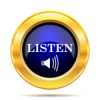Podcast: Play in new window | Download
Subscribe Now Apple Podcasts | RSS
One of the most common reasons companies ask me to speak to their teams is to teach them how to be a better listener.
In order to help team members improve their listening skills, I explain that there are three different types of listening, each of which requires different techniques to be effective.
The three types of listening:
Informational Listening
Informational listening is what you use when you are seeking new knowledge. Examples could include attending a lecture, watching an instructional video, attending a workshop, listening to a news broadcast, or listening to an instructional podcast.
Critical Listening
Critical listening is what you do when you’re evaluating or analyzing the relevance or credibility of the speaker. Examples including listening to a sales pitch, a political speech, or a television or radio commercial. You listen critically when someone is trying to persuade you of something.
Empathic Listening
Empathic listing is listening to relate. You use empathic listening when you want to identify with the speaker to understand and experience their thoughts and feelings. You also use empathic listening when you want to try to see something from the speaker’s perspective; to share their feelings.
The type of listening you use can change during a single conversation or you might use two or all three types of listening at the same time. Think, for example, about how you might listen to your teenager who wants to attend a party with friends. You use informational listen to learn the details of the event, you use critical listening to decide whether it’s a good idea for your teen to attend the party, and you use empathic listening when you remember how badly you wanted to attend parties with your friends when you were a teenager.
Here are techniques to improve your ability with each of the three types of listening:
How to become a better informational listener
- Paraphrase what was said
- Watch for your own confirmation bias
- Realize that what you believe is not necessarily accurate
- Listen more for substance than style
How to become a better critical listener
- Be skeptical
- Evaluate the credibility of the speaker
- Make a distinction between possibility, probability, and certainty
How to become a better empathic listener
- Listen without judging
- Acknowledge the other person’s feelings
- Not necessary to agree or even understand their feelings
- Ensure your non-verbals convey support
Being a good listener is one of the key skills for career success. When people feel heard, they become our advocates behind our backs. When we focus on the speaker to understand and remember what they’re saying, we gain new knowledge, a deeper understanding, and most importantly, we gain their respect.
Frankly, being a good listener is key to resolving much of today’s conflict. When people on opposite sides of an issue take the time to listen to the other side and stop shouting, tempers can simmer down. It’s not necessary to agree. It is necessary to listen. Listening is vital to de-escalation.
Psychology Today offers a listening skills test where you can learn how good a listener you are and gain insights into becoming a better listener. Use this link.
I’ve also written extensively in previous blog posts about how to be a better listener.
Next Level Customer Service Training
Enroll your team now in Compassionate Geek IT customer service training so they can work together, get things done, and take care of customers.




